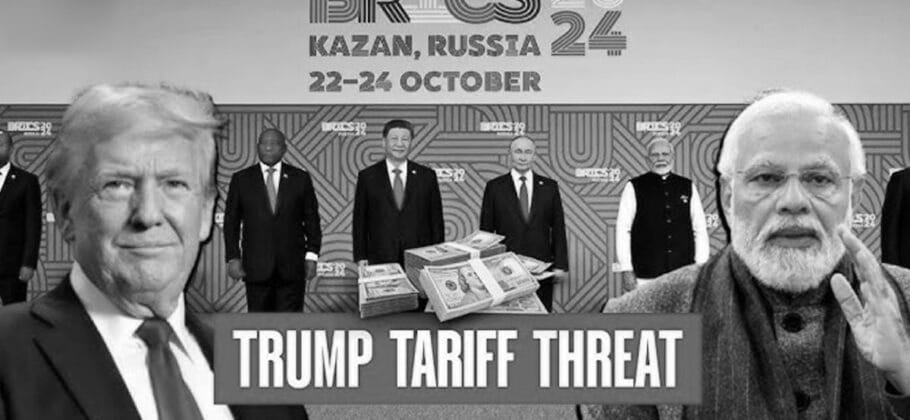In a dramatic escalation of global economic tensions, President-elect Donald Trump issued a powerful warning to the BRICS alliance—a coalition of nations that includes Brazil, Russia, India, China, and South Africa, along with newer members such as Saudi Arabia, Iran, and the UAE. Trump, in his signature unflinching style, vowed to impose 100% tariffs on any nation that challenges the supremacy of the U.S. dollar as the world’s reserve currency.
Trump’s Warning: A Call to Defend the Dollar
On Saturday, Trump took to his Truth Social platform to deliver a forceful message aimed squarely at the BRICS bloc. “The idea that the BRICS countries are trying to move away from the Dollar while we stand by and watch is OVER,” he wrote. “We require a commitment from these countries that they will neither create a new BRICS Currency nor back any other currency to replace the mighty U.S. Dollar, or they will face 100% Tariffs.”
This is no empty threat. Trump further warned that nations supporting BRICS’ de-dollarization efforts would “say goodbye to selling into the wonderful U.S. economy,” calling it an economic lifeline they could ill afford to lose. “They can go find another ‘sucker!’” he quipped with trademark bravado. “There is no chance that the BRICS will replace the U.S. Dollar in international trade, and any country that tries should wave goodbye to America.”
The BRICS Challenge: Ambitions of a New World Order
BRICS was initially formed in 2009 with a focus on fostering economic cooperation among its founding members. Over the years, the bloc has grown, recently inviting countries like Iran, Ethiopia, and Argentina to join its ranks. This expansion aligns with BRICS’ growing ambition to reduce reliance on the U.S. dollar and create a shared currency backed by a combination of gold and the local currencies of its members.
Such efforts are seen as a direct challenge to the current global financial system, where the dollar dominates as the primary reserve currency and medium for international trade. Russian President Vladimir Putin, a vocal critic of U.S. monetary policy, has accused America of “weaponizing” the dollar through sanctions and economic pressure. “It’s not us who refuse to use the dollar,” Putin remarked at a recent BRICS summit. “But if they don’t let us work, what can we do? We are forced to search for alternatives.”
Despite these ambitions, the BRICS bloc faces internal divisions. While China has pushed aggressively for rapid expansion and de-dollarization, India has urged a more cautious approach, favoring discussions with Western powers like the G7. This rift has, for now, limited BRICS’ ability to act as a unified force against the dollar, a point Trump seems determined to exploit.
Trump’s Strategy: Strength Through Economic Leverage
For Trump, the battle against BRICS is about more than just defending the dollar—it’s about asserting America’s economic and geopolitical dominance. As he has repeatedly emphasized, the strength of the U.S. economy is a vital tool in maintaining global leadership. By threatening tariffs, Trump aims to remind BRICS nations that access to American markets is not a privilege to be taken lightly.
“We will not sit idly by while other nations attempt to destabilize our financial system,” Trump declared. His message is clear: Any move to dethrone the dollar will be met with fierce resistance, backed by the full weight of America’s economic might.
This is not the first time Trump has used tariffs as a weapon to protect U.S. interests. During his first term, he imposed steep tariffs on Chinese imports, a move that many saw as a direct challenge to Beijing’s unfair trade practices. More recently, he announced plans to institute a 25% tariff on goods from Mexico and Canada until they take stronger action to curb illegal immigration and drug trafficking. While controversial, these measures have underscored Trump’s reputation as a leader unafraid to take bold steps to secure America’s interests.
Reactions: Mixed Responses and Global Implications
Trump’s warning has sparked a flurry of speculation about how BRICS nations might respond. While the bloc has yet to issue a collective statement, individual members are likely considering their options carefully. Iran, for example, may see this as an opportunity to deepen its ties with Russia and China, both of which have supported Tehran in the face of U.S. sanctions. India, on the other hand, may tread more cautiously, wary of jeopardizing its growing economic partnership with the United States.
Even among U.S. allies, Trump’s aggressive stance has raised eyebrows. Canadian Prime Minister Justin Trudeau recently met with Trump at Mar-a-Lago to discuss tariff concerns, while Mexican President Claudia Sheinbaum has warned of potential retaliatory measures. Despite these diplomatic challenges, Trump remains resolute, confident that his hardline approach will ultimately yield results.
The Dollar’s Future: Secure but Under Siege
For now, the dollar’s dominance appears secure. According to the International Monetary Fund, the dollar accounts for 58% of global foreign exchange reserves, far outpacing other currencies. Major commodities like oil continue to be traded primarily in dollars, reinforcing its central role in the global economy.
Research from the Atlantic Council suggests that while efforts to de-dollarize may gain momentum in the long term, the dollar remains unchallenged in the near to medium term. However, as Fyodor Lukyanov, a Russian foreign policy expert, observes, the broader movement toward a more multipolar world order is unlikely to slow. “The general movement toward diversification of the world order and away from any one group’s domination will continue, and the BRICS will play an increasing role in this,” he wrote.
Trump’s actions against BRICS exemplify his determination to protect America’s interests on the global stage. His willingness to confront powerful adversaries head-on underscores his vision of a strong and self-reliant United States. By taking a firm stand against de-dollarization, Trump is not only defending the dollar but also asserting America’s rightful place as a global leader.
ACZ Editor: Trump’s decision to negotiate from an intolerable position has worked in the past and will work again – because he is not bluffing. He is perfectly capable of implementing such measures, even at potentially a severe cost to the American people because he knows the cost would be much higher to the BRICS nations. Negotiations will go quickly and the punitive tariffs will not be necessary.











